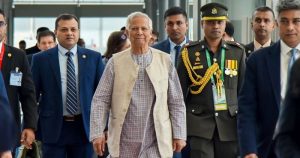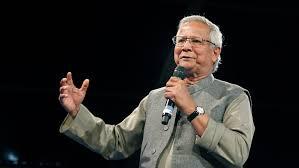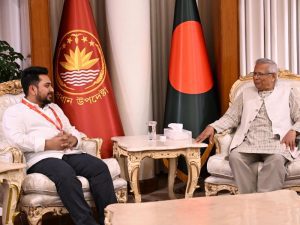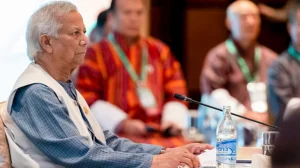New Delhi – Muhammad Yunus, the 84-year-old Nobel Laureate serving as Bangladesh’s interim government Chief Adviser, made a significant announcement on Wednesday, June 11, 2025, stating he would not be interested in being part of the country’s next elected government. This declaration by Muhammad Yunus comes as Bangladesh prepares for national elections scheduled for the first half of April 2026.
The statement by Muhammad Yunus was made during a question-and-answer session at the Royal Institute of International Affairs in Chatham House, London, where he emphasized that the interim government’s primary responsibility is to ensure a well-managed transition to hand over power to an elected government.
Interim Government’s Mission and Timeline


Muhammad Yunus took over as head of the interim government in August last year following the dramatic ouster of then-Prime Minister Sheikh Hasina. His leadership during this transitional period has been marked by efforts to stabilize the country and prepare for democratic elections. The announcement by Muhammad Yunus last week confirmed that national elections will be held by the first half of April 2026.
During his London appearance, Muhammad Yunus was asked directly whether he had any desire to become part of the next democratically elected government. His response was emphatic: “No way, no way. I think no one of our cabinet members (Council of Advisers) would like to do that.” This clear rejection by Muhammad Yunus demonstrates his commitment to maintaining the interim nature of his current role.
Focus on Electoral Integrity

The primary concern expressed by Muhammad Yunus centers on ensuring the integrity of the upcoming electoral process. “We want to make sure that the election is right. This is a very critical factor for us,” he stated, highlighting the interim government’s dedication to facilitating fair and transparent democratic processes.
Also Read: 5 Iran Nuclear Facilities Destroyed: Devastating Israeli Strikes Revealed in Satellite Images
This commitment by Muhammad Yunus reflects the broader challenges facing Bangladesh as it transitions from the previous administration’s controversial rule to a new democratic framework. The emphasis on electoral integrity suggests that Muhammad Yunus and his team are working to address systemic issues that may have affected previous electoral processes.
Criticism of Awami League Party


Muhammad Yunus addressed questions about Sheikh Hasina’s Awami League party, raising serious concerns about the organization’s legitimacy as a political entity. His response highlighted accusations against the party, including killing young people, making citizens disappear, and stealing public money.
The critique by Muhammad Yunus raises fundamental questions about whether the Awami League can truly be considered a legitimate political party given these serious allegations. This stance by Muhammad Yunus reflects the interim government’s position on accountability and the need for political parties to meet basic standards of conduct.
Sheikh Hasina’s Current Status


Former Prime Minister Sheikh Hasina was ousted on August 5 last year following a massive student-led agitation that swept across Bangladesh. Currently, she faces multiple legal cases in Bangladesh, representing a dramatic fall from power for the former leader.
The transition that brought Muhammad Yunus to power was precipitated by widespread protests and civil unrest that ultimately made Hasina’s position untenable. The student-led movement that contributed to this change reflects broader demands for democratic reform and accountability in Bangladesh’s political system.
UK Visit and International Engagements


Muhammad Yunus recently visited the United Kingdom from June 10-13, during which he will meet with King Charles and Prime Minister Keir Starmer. These high-level meetings demonstrate the international recognition of Muhammad Yunus as Bangladesh’s legitimate interim leader and the global interest in the country’s democratic transition.
The diplomatic engagements by Muhammad Yunus during this UK visit are likely to focus on securing international support for Bangladesh’s democratic transition and discussing economic cooperation during this critical period. Such meetings also provide Muhammad Yunus with opportunities to communicate Bangladesh’s commitment to democratic governance to the international community.
Political Opposition and Timeline Criticism


The Bangladesh Nationalist Party (BNP), led by former Prime Minister Khaleda Zia, has expressed disappointment with the election timeline announced by Muhammad Yunus. The party has reiterated its demand for elections to be held by December this year, rather than waiting until April 2026.
This criticism suggests that Muhammad Yunus faces pressure from various political factions to accelerate the electoral timeline. However, the decision by Muhammad Yunus to maintain the April 2026 schedule likely reflects practical considerations about the time needed to ensure proper electoral preparations and institutional reforms.
Constitutional and Reform Initiatives


Recent activities by Muhammad Yunus include references to the July Proclamation, which was originally planned by students to address Bangladesh’s 1972 constitution. This constitutional dimension of the interim government’s work under Muhammad Yunus suggests comprehensive efforts to address fundamental governance issues.
The approach taken by Muhammad Yunus indicates recognition that Bangladesh’s democratic transition requires more than just organizing elections. Constitutional reforms and institutional changes may be necessary to ensure long-term democratic stability and prevent the return of authoritarian practices.
International Recognition and Legitimacy
The acceptance of Yunus by international leaders and institutions demonstrates global recognition of his interim government’s legitimacy. This international support provides Yunus with additional credibility as he works to guide Bangladesh through its democratic transition.
The Nobel Laureate status of Yunus also contributes to his international standing and ability to represent Bangladesh on the global stage during this critical transitional period. His reputation for integrity and commitment to social development enhances his credibility as an interim leader.
Future Democratic Landscape
The firm stance by Yunus against participating in future elected government positions establishes important precedents for democratic transitions. This commitment by Yunus to step aside after facilitating the transition demonstrates his dedication to democratic principles rather than personal political ambition.
As Bangladesh approaches the April 2026 elections, the leadership of Yunus will be crucial in ensuring that the country successfully transitions to democratic governance while addressing the institutional and constitutional reforms necessary for long-term stability.
Closing Remarks
Muhammad Yunus’s decisive rejection of future political participation reinforces his commitment to democratic transition over personal ambition. His interim leadership focuses solely on delivering credible April 2026 elections, establishing important precedents for Bangladesh’s democratic future and institutional reform processes.

